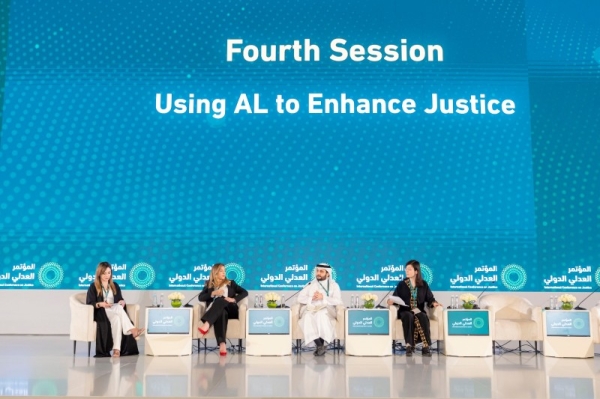
RIYADH: Experts have stressed the importance of benefiting from the applications of artificial intelligence in many fields in the justice sector, pointing to the impact of this on many other sectors during the International Conference on Justice, held at the Ritz Carlton in Riyadh today.
Reema Aref, EY Law KSA leader, said that the increasing presence of artificial intelligence in various sectors, including the justice system, is expected to significantly impact both economic and social matters for establishments and individuals, as well as the overall quality of life.
On the economic front, AI is expected to drive innovation and efficiency, leading to increased productivity and economic growth. For example, AI-powered automation can help businesses streamline their operations and reduce costs, while AI-powered data analytics can help organizations make more informed decisions and identify new growth opportunities, she said.
The justice system is one area where the application of AI has the potential to be particularly transformative. AI tools can assist in several aspects of the justice system, including case management, legal research, decision-making and judgments. AI can help improve the efficiency and accuracy of legal proceedings without affecting judicial warranties while ensuring that justice is delivered more fairly and accurately, Aref said.
On the social front, the impact of AI on individuals and society is complex and multifaceted. AI has the potential to improve access to education, health care and other services. It can also help to address issues of social inequality and discrimination by reducing human bias in decision-making, she said.
Overall, the impact of AI on economic and social matters and the quality of life will depend on how AI is developed, deployed and regulated, she said.
Reema Aref, EY Law KSA leader. (Supplied)
Aref said that to ensure that AI benefits society as a whole, it is important to address concerns around ethics, accountability and transparency and to work toward creating a regulatory framework that promotes the fair, responsible and ethical development and use of AI.
“New technologies, including AI, are affecting our daily lives in many aspects in all sectors, and the legal sector is not an exception,” according to Fawwaz Alshammari, a new technologies expert.
He said that the legal sector is conservative in adapting new technologies until other sectors apply them to see their benefits and drawbacks, mainly because of the sensitivity of the legal sector.
“However, Saudi Arabia is ahead of other sectors adapting the new technologies, in general, to ensure they provide an amazing customer experience to their customers. Najiz (judicial e-services portal) is a clear example of such an entrepreneur mindset.”
Fawwaz Alshammari, a new technologies expert. (Supplied)
Some analysts might argue the negative impact and risks of using the AI in the legal sectors via data security risks or the impact of it on lawyers’ jobs, which might make sense to certain extend, he said.
“However, all risks can be mitigated by looking at the huge benefits AI can do for us in the legal sector. In fact, AI will not replace lawyers’ jobs, but rather it will help them to be more efficient and accurate in doing their jobs.”
It can also help in the legal sector, by structuring unstructured data in a very short time. AI can also analyze the data in a few hours, while a “genius lawyer” can do it in months, Alshammari said.
“The main challenge for us here in Saudi is the availability of an AI platform that can deal with Arabic data, as it seems we need a long way to go. However, seeing such a conference organized by the Ministry of Justice clearly indicates the importance of AI and new technologies for the ministry,” Alshammari said.











